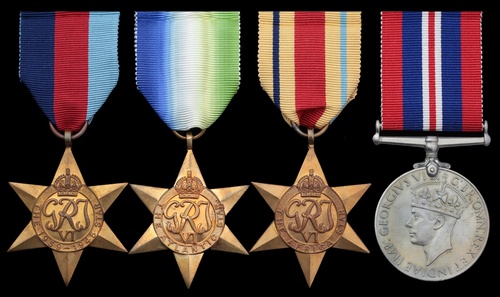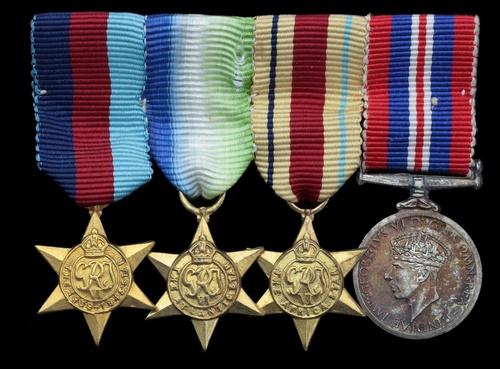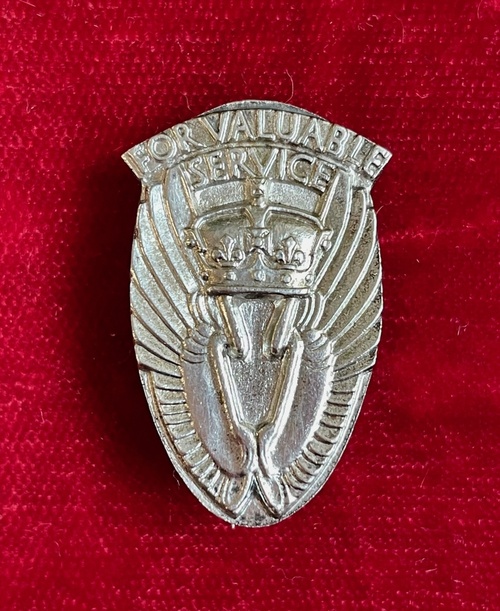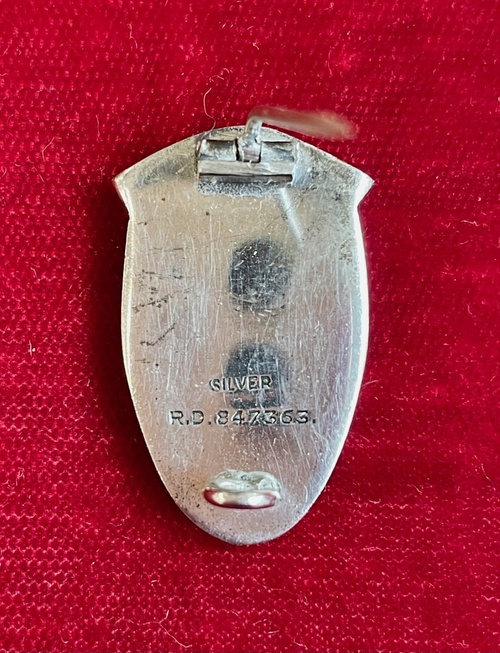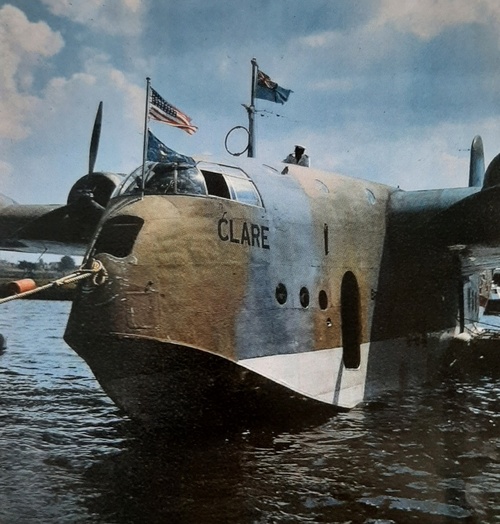Auction: 22103 - Orders, Decorations and Medals VII - e-Auction
Lot: 676
An early 1943 King's Commendation for Valuable Service in the Air group of five awarded to Captain J. P. Kirton, British Overseas Airways Corporation, late Royal Air Force, whose 1940 delivery of a bundle of British newspapers to New York at the height of the Blitz cut through the attempts by Nazi propagandists to depict London as a 'a vacant shell' and Fleet Street 'bombed out of action'
1939-45 Star; Atlantic Star; Africa Star; War Medal 1939-45, in named O.H.M.S. box of issue; King's Commendation for Valuable Service in the Air, good very fine (5)
One of the first 46 King's Commendations for Valuable Service in the Air
King's Commendation for Valuable Service in the Air, London Gazette 4 June 1943
John Potbury Kirton was born at Stoubridge, Shropshire on 20 June 1905, the son of David and Margaret Kirton. Raised by his Grandparents at Oxford Kirton joined the Royal Air Force on 26 Jun 1923 and was posted to 'B' Wing, R.A.F Cranwell on 20 September 1923. Promoted Leading Aircraftman he saw service in Palestine from 16 March 1924 before joining No. 208 Squadron in Egypt on 10 April. After a period at a flying training school he was promoted Sergeant on 27 June 1927 and posted to No. 45 Squadron on 21 July. While serving with this unit Kirton qualified as a pilot, this around the time that the unit transferred to Fairey III aircraft. Transferring to No. 47 Squadron on 8 December 1927 he served with them in the Sudan until 10 December 1928, here they flew patrols in conjunction with the Sudan Defence Force.
Transferring to the Reserve on 26 June 1932 Kirton joined Hillman Airways and flew for them as a Captain. He suffered a string of bad luck while flying for Hillman in 1935, firstly when a consignment of gold was shaken from his aircraft on a trip between London and Paris- along with a certain amount of less valuable luggage of which one suitcase was discovered- in January 1935. Later that year he was piloting the aircraft in the distressing case of the Du Bois sisters. These young women - daughters of the American Consul to Britain - were suffering from a deep depression after the deaths of the young flying officers who they were courting. After the plane reached 2,000 feet it encountered turbulence, and Kirton opened the cockpit door to check on his passengers - but discovered the lounge was empty. An inquest cleared him of any suspicion, with the sisters having left a letter written to their parents explaining their decision, leaving all in no doubt that the deaths were suicide.
Kirton- not unreasonably- left that same year, by the opening of the Second World War he was flying for the British Overseas Airways Corporation. He flew first to Lisbon and later- aboard the Clare- New York on 14 August 1940 flying via Halifax with Under-Secretary of State for Air, Harold Balfour as a passenger. His next New York Odyssey earning an entry in Merchant Airmen which explains the effect of the arrival of Clare and her cargo:
'This very Atlantic flight by Clare did more to nurture and foster that new hope in America than probably any other single factor. There was, firstly, the fact that she had been able to make the flight at all. It seemed unbelievable that an unarmed flying-boat could have taken off from the midst of the Battle of Britain and flown calmly to New York, just as in peacetime; yet there she lay at her moorings at La Guardia, her camouflaged wings and hull the only sign of war. It was assumed that she has left Britain under a strong fighter escort; but there had been no escort- the fighters were engaged in more pressing duties- only an unarmed merchantman, flying alone.'
Kirton's route was then switched - along with the Clare - to West Africa, flying regularly via Lisbon to Lagos or via Gibraltar and Malta to Cairo. Changing again in 1943 he returned to the Atlantic route between Prestwick and Montreal, a passage he flew until the end of the war. Kirton died at Great Yarmouth in 1986; sold together with a copy of Merchant Airmen, the recipient's Captains epaulettes and original documentation from B.O.A.C. relating to the award of the King's Commendation as well as copied research including census data, newspaper articles and R.A.F. service records along with London Gazette entries, handwritten research and medal qualification claims - annotated to include details of the recipient's war service with B.O.A.C.
Subject to 20% VAT on Buyer’s Premium. For more information please view Terms and Conditions for Buyers.
Sold for
£350
Starting price
£280

